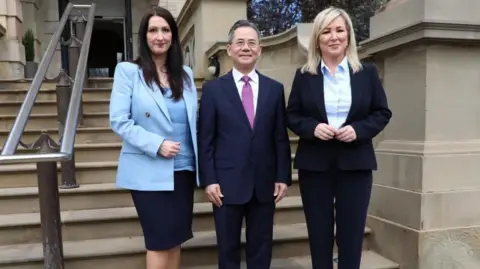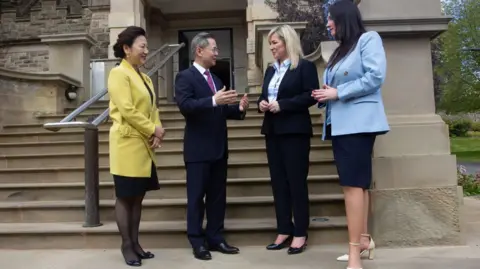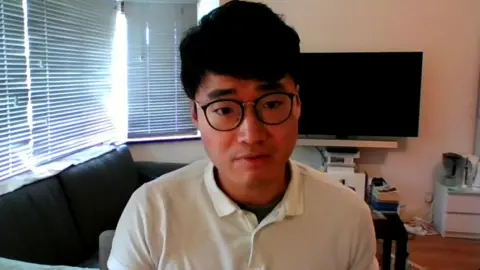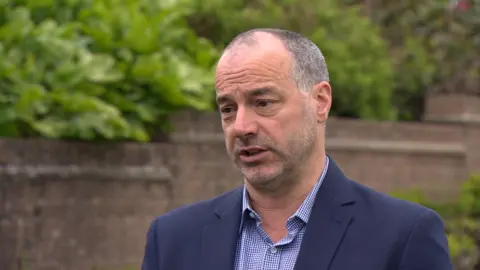Secrecy over China meeting 'absurd', say campaigners
 Chinese Embassy
Chinese Embassy The office of Northern Ireland's first and deputy first ministers has been criticised by human rights campaigners for refusing to release records of a meeting with a senior Chinese diplomat.
Michelle O'Neill and Emma Little-Pengelly welcomed the UK's Chinese ambassador Zheng Zeguang to Stormont Castle in Belfast in May.
But their office has declined to publish any notes of the meeting, arguing it could harm "international relations".
Exiled Hong Kong pro-democracy activist Simon Cheng described the Executive Office's response as "deeply troubling".
The former employee of the UK's Hong Kong consulate has previously told how he was tortured in China and accused of inciting political unrest.
"For the people of Northern Ireland who cherish freedom and democracy, this lack of transparency is unacceptable," he said.
"They deserve to know the nature of the discussions held with a representative of a regime known for its human rights abuses," he added.
The Chinese Embassy released its own report of the meeting, saying they discussed "friendship and cooperation" between China and Northern Ireland.
A fortnight after the meeting, the Chinese ambassador was summoned to the Foreign Office following allegations of "foreign interference in the UK" including cyber attacks.
 Chinese Embassy
Chinese Embassy'Pattern of secrecy'
Patrick Corrigan of Amnesty International said TEO's approach was "somewhat absurd" and showed an "unacceptable pattern of secrecy".
He had submitted a Freedom of Information (FOI) request seeking minutes of the meeting and asking whether human rights issues were discussed.
In its response TEO said the information "cannot be disclosed at this time", citing an exemption under the FOI Act on "international relations".
The department said it needed more time to consider "where the balance of the public interest lies".
Mr Corrigan contrasted the approach to the UK government which "regularly publishes reports of its meetings with overseas governments" and highlights "when ministers raise human rights concerns".
"People have a right to know what is being said on our behalf, particularly to a government responsible for atrocious human rights abuses," he added.

Hundreds of people in Hong Kong have been arrested since China introduced a controversial national security law in 2020 in response to pro-democracy protests.
China has also been accused of the detention of an estimated 1,000,000 people from the minority Uyghur population in so-called "re-education" camps in the north-western region of Xinjiang.
Beijing and Hong Kong authorities argue the security law is necessary to maintain stability and deny it has weakened autonomy.
China has also denied allegations of human rights abuses in Xinjiang.
Mr Corrigan added: "This latest refusal to disclose what was discussed is part of an unacceptable pattern of secrecy from the Executive Office about such meetings with the Chinese government going back years."
For years Stormont has worked to develop links with China, with the executive setting up a trade bureau in Beijing in 2014.
In 2022, TEO was found by the Information Commissioner's Office to have breached FOI legislation in refusing to release records of a meeting with Belfast's Chinese consul general.
TEO was approached for further comment on declining to release notes of the meeting with the Chinese ambassador, but it did not respond.

Analysis: Stormont muted on China's record
Many Northern Ireland politicians pride themselves on speaking up for human rights on the global stage.
Their focus of concern in recent times has tended to be on Russia’s war in Ukraine and the Israel-Gaza war.
But when it comes to China's record on human rights, the corridors of power at Stormont seem more muted.
There is seldom mention of China's detention of minorities in "re-education camps", nor its controversial Hong Kong security law which has clamped down on pro-democracy protests.
For campaigners, the refusal to publish records of meetings with Chinese diplomats raises fears that no concerns are being raised in private, never mind in public.
The Northern Ireland Executive has, for years, courted China for educational links and investment, setting up a trade bureau in Beijing in 2014.
In warning that releasing minutes of meetings could damage "international relations", it is clear Stormont wants these connections to continue.
But when it comes to public transparency - particularly on human rights - campaigners say there should be no compromise.
